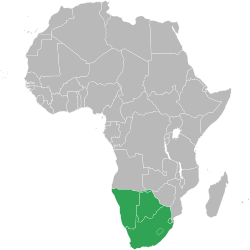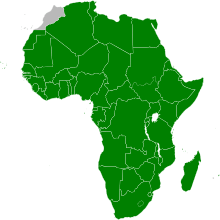Southern African Customs Union

The Southern African Customs Union (SACU) is a customs union among five countries of Southern Africa: Botswana, Lesotho, Namibia, South Africa and Swaziland. Its headquarters is in the Namibian capital Windhoek.
History
SACU is the oldest existing customs union in the world.[1] It was established in 1910[2] pursuant to a Customs Union Agreement between the then Union of South Africa and the High Commission Territories of Bechuanaland, Basutoland and Swaziland. With the advent of independence for these territories, the agreement was updated and, on 11 December 1969, it was relaunched as the SACU with the signing of an agreement between the Republic of South Africa, Botswana, Lesotho and Swaziland. The updated union officially entered into force on 1 March 1970. After Namibia's independence from South Africa in 1990, it joined SACU as its fifth member.
As of 2007, the Executive Secretary of the SACU was Tswelopele C. Moremi.
Functions and organisation
The union meets annually to discuss matters related to the Agreement. There are technical liaison committees, namely the Customs Technical Liaison Committee, the Trade and Industry Liaison committee and the Ad hoc Sub-Committee on Agriculture, which meet three times a year.
Its aim is to maintain the free interchange of goods between member countries. It provides for a common external tariff and a common excise tariff to this common customs area. All customs and excise collected in the common customs area are paid into South Africa’s National Revenue Fund. The revenue is shared among members according to a revenue-sharing formula as described in the agreement. South Africa is the custodian of this pool. Only the BLNS Member States' shares are calculated with South Africa receiving the residual. SACU revenue constitutes a substantial share of the state revenue of the BLNS countries.
Developments and structure
Following the formation of the Government of National Unity in South Africa in April 1994, Member States concurred that the present Agreement should be renegotiated to democratise SACU and address the current needs of the SACU Member States more effectively.
With this in mind, the Ministers of Trade and Industry of the five member states met in Pretoria on 11 November 1994 to discuss the renegotiation of the 1969 agreement. The Ministers appointed a Customs Union Task Team (CUTT) which was mandated to make recommendations to the Ministers. CUTT has met on numerous occasions in the Members States and good progress has been made in the renegotiation process.
At a meeting of Ministers of Trade and Finance Departments from the SACU Member States, held in Centurion, Pretoria on 5 September 2000, the Ministers reached consensus on the principles of underpinning institutional reform in the SACU.
The Administrative Institutional structure of the revenue pool that was discussed was agreed to consist of the following:
- Council of Ministers
- A body represented by one minister from each SACU member state. It would be the supreme SACU decision-making body and would meet quarterly. The decisions taken by this council would only be by consensus.
- Commission
- Administrative body composed of Senior Officials, three Technical Liaison Committees and an established Agricultural Liaison Committee.
- Tribunal
- An independent body of experts. It would report directly to the Council of Ministers. The tribunal would be responsible for tariff-setting and the Anti-dumping Mechanism.
- Secretariat
- Responsible for day-to-day operations of the pool. It would be funded from the revenue pool. Its location would be determined by Senior Officials who were directed to meet after one month to develop proposals for the implementation of the revised SACU Institutional Structure.
SACU Ministers further agreed that the revenue share accruing to each Member State should be calculated from three basic components:
- a share of the customs pool;
- a share of the excise pool; and
- a share of a development component.
It was agreed that these components would be distributed as follows:
- The customs component should be allocated according to each country’s share of total intra-SACU trade, including re-exports.
- The excise component, net of the development component, should be allocated on the basis of GDP.
- The development component should be fixed at 15% of the total excise pool and distributed to all SACU members according to the inverse of each country’s GDP/capita.
While SACU entered into a free trade deal with the four-nation European Free Trade Association on 1 July 2006, its negotiations with the United States for a free trade agreement have stalled (as of 8 January 2008).[3]
SACU is involved in negotiations for a free trade agreement - the Economic Partnership Agreements (EPAs) - with the EU, and the organisation has corresponded with EU Trade Commissioner, Karel De Gucht, between February and March 2010, to request that the EU did not demand the ratification and implementation of the EPAs at the next round of negotiations without the concerns of the SACU countries being addressed. De Gucht replied that he would like to "invite the SADC EPA countries concerned to swiftly complete signature, notification and implementation of the interim EPA" and that "in the meantime, the EU is more than willing to address all pending issues and concerns."[4][5][6] by Albertina
See also
- 1903 Southern African Customs Union Agreement
- Trade bloc
- Common Monetary Area
- Southern African Development Community (SADC)
- Common Market for Eastern and Southern Africa (COMESA)
References
- ↑ WTO Trade Policy Review: Southern African Customs Union 2003
- ↑ Ali M. El-Agraa, The European Union economics and policies, Ed. Cambridge University Press, Cambridge, 2007, p.7.
- ↑ USTR - Southern African Customs Union Free Trade Agreement
- ↑ http://stiffkitten.wordpress.com/2010/05/03/eu-dismiss-concerns-of-southern-african-customs-union
- ↑ Letter from SACU to De Gucht, 11 February 2010
- ↑ Letter from De Gucht to SACU, 31 March 2010
External links
| Wikimedia Commons has media related to Southern African Customs Union. |
- SACU official website
- Explanatory website from the South African government
- Agritrade website covering trade issues in southern Africa
